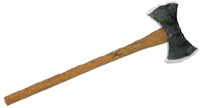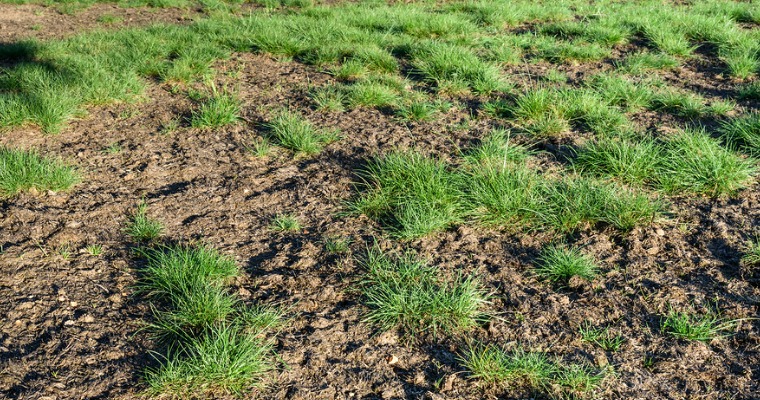Ensuring proper runoff and drainage is an essential step in maintaining a healthy lawn. If rainwater accumulates in your lawn rather than draining away from it, it can lead to numerous problems later down the road. To learn more about soil erosion and how to prevent it, keep reading.
What Causes Soil Erosion?
Soil erosion is typically caused by excessive rainfall or irrigation in areas of a lawn with poor runoff.
Water is essential for all living organisms, and grass is no exception. Without rain, your lawn would turn brown and die, regardless of the variety.
But too much water can be equally as bad. When water pools up on a law, it washes away the topsoil, which is where a significant concentration of beneficial nutrients and microorganisms are located.
Furthermore, soil erosion can cause problems to your actual home. Allowing water to pool up along the perimeter of your home can cause increased moisture inside your home, especially the basement or crawl space.
And as most homeowners already know, moisture leads to mold – something that you definitely want to keep out of your home.
How to Prevent Soil Erosion
Thankfully, there are several steps you can take to protect your lawn from soil erosion, beginning with maintaining healthy grass.
If your lawn’s current grass is thin and weak, it’s more likely to get washed away during a rainstorm. However, if you choose a hearty grass, it will serve as a natural barrier, protecting your lawn and the underlying soil from erosion.
You can also reduce the risk of soil erosion by ensuring your soil is compacted. If you recently added a new layer of soil, make sure it’s compacted enough to withstand small streams of water.
Contrary to what some people believe, you don’t need any special machine or equipment to perform this task. As explained in this SFGate article, you can compact your lawn’s soil using a water hose.
Of course, grading a lawn is essential if it doesn’t have proper runoff.
What is proper runoff? Basically, your lawn should be sloped down and away from your home.
If your lawn slopes towards your home, water will accumulate at the base where some of the moisture subsequently seeps into your home’s crawlspace or basement.
Baffles and barriers can also be used to prevent soil erosion. Once installed, they obstruct the flow of water, diverting it downhill towards the appropriate area.
Most baffles and barriers are made of, or at least contain, stone or wood. They are best used for small slopes.
The Woodsman Company offers tree planting, tree pruning and shrub trimming, tree removal and stump grinding as well as a tree wellness program.
If we can help with any of your tree care needs give us a call at 512-846-2535 or 512-940-0799 or


This article was so helpful! My lawn is sloping towards my house after a demo and re-build in Spokane. The tree company I am with is coming to fix the problem tomorrow. This article is full of helpful information to bring up in my conversation with them [edited by admin]. They are always very understanding. Thanks again for the information and the great post. God Bless!!
The stability of your buildings and the success of your plantings depend on the nature of your particular piece of land and its soils. Glad to read this useful information. Keep posting!
With all of the rain we get where I live, erosion is a big topic talked about, so I’m trying to do my part in preventing it. I like that you said a hearty grass, rather than thin, serves as a barrier in protecting the soil beneath. I’ll have to take a look and see what our grass is like, and have it replaced if needed.
Thanks for the tip about getting hearty grass to prevent soil erosion. It would make sense to find a qualified service to help you out as well if something goes wrong. I’m dealing with soil erosion in my yard, so maybe I need to get better grass.
Thanks for the tip about considering if you have the proper runoff in your yard. It would be smart to consider this because it would show that they are qualified as well. My husband and I are looking for erosion control, so we’ll have to consider our yard’s runoff first.
It’s good to know there are several techniques for preventing soil erosion. I’ll have to make sure I take good care of the soil first. It sounds like keeping it compacted is one of the best and simplest ways to prevent erosion, like you said.
So I think I am having a small problem with my soil eroding. There are a couple of spots around my yard that are much lower than the rest. I might do what you suggested and try to compact the soil so that there is less of a chance of it eroding away. If that doesn’t work, I can always call a professional to see what they can do for me.